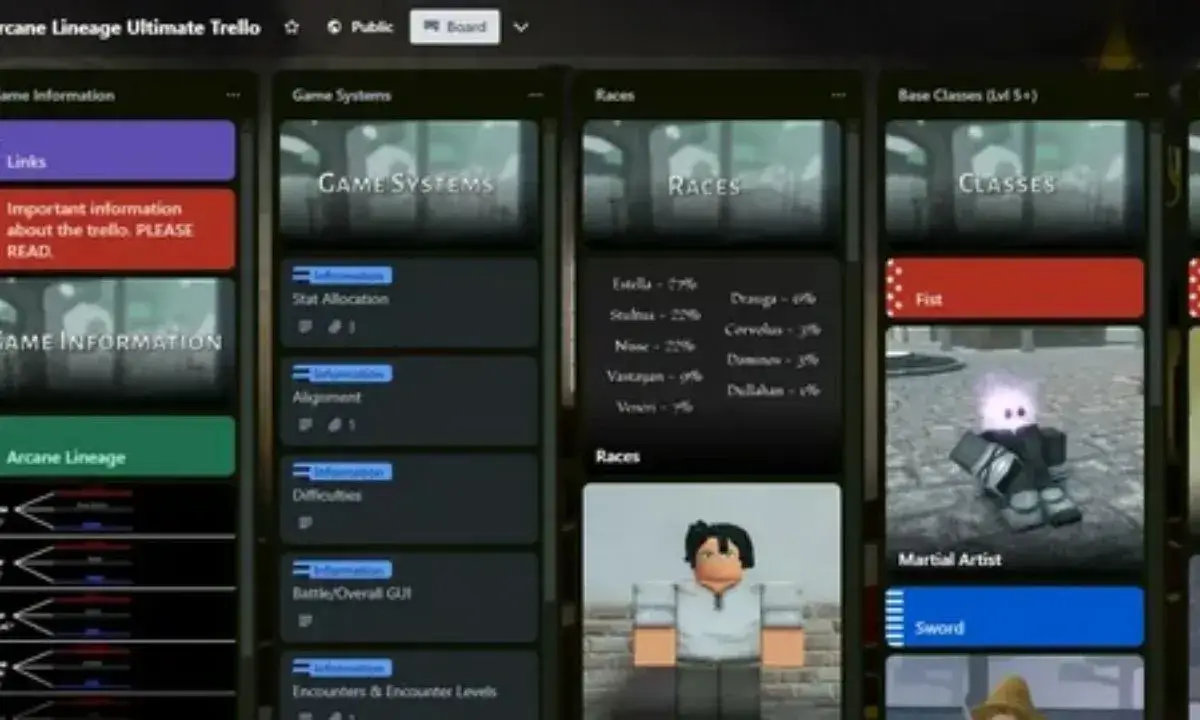If you’ve recently started exploring Arcane Lineage, you’ve probably heard about the Arcane Lineage Trello — a digital board that helps players navigate the game’s deep magical systems, class trees, and complex world structure. This isn’t just a casual resource; it’s an essential tool for anyone serious about mastering the game. Whether you’re a newcomer eager to build your first character or a seasoned player planning advanced strategies, this guide will show you how to use Trello to organize your magical journey effectively.
Introduction to Arcane Lineage Trello
Arcane Lineage is a fantasy RPG on Roblox that revolves around classes, progression, combat, and world exploration. The game features a complex network of classes, abilities, weapons, and regions, making it easy for beginners to feel overwhelmed. That’s where the Arcane Lineage Trello board comes in — a visual, easy-to-use organization tool created by the developers and community to simplify gameplay.
The Trello functions as a digital encyclopedia where every class, boss, region, and quest is documented. It’s updated regularly, providing players with a reliable roadmap to follow. Think of it as your personal magical spellbook that keeps your adventures organized, structured, and strategic.
What Is Trello and Why It’s Used for Arcane Lineage
Before diving into Arcane Lineage Trello specifically, let’s clarify what Trello actually is. Trello is an online project management tool built around a card, list, and board system. Each “board” acts as a workspace, where users can create lists (columns) filled with cards (tasks, notes, or information).
In the context of Arcane Lineage, Trello helps organize everything you need to know about the game — from base classes and boss encounters to quests and items. Developers and community managers use Trello because it’s transparent, easy to update, and accessible to all players.
Why Trello Works for Arcane Lineage:
- Visual structure: You can see game elements laid out in lists (like Classes, Weapons, or Regions).
- Accessibility: Works across desktop and mobile browsers.
- Collaboration: Developers, testers, and players can contribute updates.
- Efficiency: Quicker than browsing wikis or long text guides.
Trello serves as both a magical organization tool and a living game manual, helping players keep track of everything happening in the evolving world of Arcane Lineage.
History and Background of the Arcane Lineage Trello
The Arcane Lineage Trello began as an internal development tracker, allowing the team to record progress, bugs, and balancing notes. Over time, as the player base expanded, the developers made parts of it public to help players understand game mechanics.
It quickly became a central hub for:
- Patch notes and updates
- Class trees and ability details
- Enemy and boss data
- Quest and map information
As community engagement grew, fan-maintained Trellos also emerged, expanding on the original board with deeper lore explanations, player strategies, and screenshots. Today, the Trello stands as the most accurate and up-to-date Arcane Lineage wiki alternative, offering everything from gameplay basics to advanced strategy tips.
Inside the Arcane Lineage Trello: Key Sections Explained
Let’s break down the most useful parts of the Trello board, so you know exactly where to look.
| Section Name | Purpose |
|---|---|
| Game Overview | Introduction, controls, and beginner tips. |
| Playable Races | Details on available races, perks, and stat bonuses. |
| Base Classes | First-tier classes and their requirements. |
| Advanced & Legendary Classes | Powerful upgrades with unique abilities and stat scaling. |
| Skills & Abilities | Descriptions, cooldowns, and scaling of combat skills. |
| Weapons & Armor | Stats, crafting info, and drop sources. |
| Locations & Regions | Maps and recommended level zones. |
| Enemies & Bosses | Level requirements, weaknesses, and loot tables. |
| Quests & Storylines | Step-by-step mission guides and side quests. |
| Patch Notes & Updates | Logs of all recent balance changes and new features. |
Each list within the Trello contains cards representing specific elements — like a card for the “Brute” class or “Forest Guardian Boss.” These cards include images, ability breakdowns, and stat charts that simplify decision-making.
How to Use Arcane Lineage Trello as a Beginner
If you’re new to Trello, don’t worry. Here’s a simple walkthrough to help you get started:
Step-by-Step Process
- Access the Board:
Visit the official Arcane Lineage Trello link. It’s usually pinned in the game’s official Discord server or Roblox description. - Explore the Sidebar:
Look for lists like “Classes,” “Bosses,” and “Quests.” These are your main categories. - Start with Base Classes:
Review the base class cards to understand which one suits your playstyle (melee, magic, hybrid). - Plan Class Progression:
Use Trello’s “Advanced Classes” list to chart your upgrade path. - Review Enemies Before Fighting:
Check boss cards for attack patterns, weaknesses, and recommended levels. - Use the Search Bar:
Quickly find items, quests, or skills by name. - Bookmark or Follow Updates:
Enable notifications or check frequently — new content is added regularly.
Benefits of Using the Trello Board for Arcane Lineage
Relying on memory or scattered guides can waste hours. Trello eliminates that problem. Here are the core benefits:
- Faster Learning Curve: You’ll grasp core mechanics without trial and error.
- Accurate Information: Updated directly by trusted sources.
- Optimized Builds: You can visualize progression from start to end.
- Better Decision-Making: Avoid costly mistakes like locking into weak builds.
- Community Integration: Trello often links to the official Discord for further discussion.
A well-organized magical system, whether in a game or creative writing, is key to mastery — and Trello brings that organization to life.
Getting Started: What to Check First
When you open the Arcane Lineage Trello for the first time, focus on these essentials:
- Beginner-friendly classes such as Warrior or Mage.
- Safe zones for early-level grinding.
- Quest order to level efficiently.
- Stat scaling overview for your preferred combat type.
- Basic equipment recommendations to avoid underperforming.
This early setup ensures you don’t waste time exploring high-level regions unprepared.
Planning Your Character Build Using Trello
Planning your character in Arcane Lineage is like designing a blueprint. Trello helps you map it visually.
| Example Build Path | Description |
|---|---|
| Brute → Iron Fist → Monk | High-strength melee path, focused on close combat and stamina. |
| Mage → Sorcerer → Arcanist | Magic-based build with elemental damage scaling. |
| Scout → Assassin → Shadow Dancer | Agility build designed for critical strikes and mobility. |
Tips for Effective Planning
- Review stat requirements before committing to a class.
- Check the weapon scaling table — some weapons scale with Dexterity or Magic rather than Strength.
- Plan ahead for Legendary class unlocks, which often require defeating specific bosses or completing hidden quests.
- Use Trello’s class comparison cards to visualize trade-offs between speed, defense, and offense.
Real-Life Examples of Using Trello for Arcane Lineage Success
Example 1:
A new player wanted to become a powerful Mage but didn’t know how to progress.
By checking Trello, they found that Sorcerer requires reaching Level 15 and completing a specific quest line. They planned accordingly and reached advanced levels faster than those guessing their way through.
Example 2:
A group of players coordinated a boss raid using Trello’s boss list.
They divided tasks — one tanked, one healed, one dealt DPS — all based on the Trello’s detailed attack patterns. The result? A flawless victory.
Example 3:
A returning player used Trello’s patch notes to rebuild their outdated character.
They noticed stat scaling had changed for their class, preventing weak performance in PvP matches.
These examples highlight how Trello transforms guesswork into structured gameplay.
Troubleshooting and Common Beginner Mistakes
Even with Trello, players can slip up. Here are frequent errors and how to avoid them:
| Mistake | Solution |
|---|---|
| Ignoring level requirements | Always read level caps on class or region cards. |
| Relying on outdated YouTube guides | Use Trello updates — they’re more accurate and timely. |
| Misinterpreting class icons | Hover over icons or read full card descriptions before choosing. |
| Forgetting to check patch notes | Class balance changes frequently; always review before upgrading. |
| Confusing community Trello versions | Use only the official board link shared on verified sources. |
Frequently Asked Questions
Is Arcane Lineage Trello official?
Yes. The main Trello is maintained by the development team, though some fan Trellos exist for added resources.
How often is the Trello updated?
Usually after each major game update or balance patch.
Can mobile users access Trello?
Absolutely. Trello’s mobile interface works well on browsers and its dedicated app.
Do you need a Trello account to view it?
No. Anyone can open the board without signing up.
Are there multiple Trello boards for Arcane Lineage?
Yes, but stick to the official one to avoid outdated or incorrect information.
Arcane Lineage Trello vs Other Resources
| Resource | Pros | Cons |
|---|---|---|
| Trello Board | Organized, visual, fast updates | Limited lore depth |
| Wiki Sites | Detailed lore and background info | Sometimes outdated or incomplete |
| YouTube Guides | Visual learning and tips from experts | May not reflect newest patch changes |
| Discord Communities | Real-time advice and collaboration | Info can get lost in chat threads |
Trello acts as the foundation — the most structured, accessible database for facts and figures. Pair it with other sources for storytelling or lore exploration.
Why a Well-Organized Magical System Matters
Arcane Lineage thrives on magic system complexity. Classes, skills, and elements mirror how fantasy writers organize their own worlds — with structure, logic, and creativity. The Trello acts like a digital grimoire, where every spell, boss, and location has its place.
In creative terms, this teaches beginners an important principle:
“Magic feels real when it’s organized with rules.”
Using Trello mirrors how worldbuilders and game designers structure their ideas — transforming chaotic creativity into a clear, usable system.
Conclusion
The Arcane Lineage Trello is more than a tool — it’s your personal map through a vast magical world. It turns confusion into clarity, chaos into structure, and uncertainty into confidence. Whether you’re planning your first build, coordinating raids, or exploring advanced strategies, Trello ensures every step is purposeful.
Key Takeaways:
- Bookmark the official Trello link for real-time updates.
- Start with your base class, then explore progression paths visually.
- Check boss weaknesses and drop tables before every major fight.
- Use Trello as both a learning tool and a strategic planner.
In the end, mastery in Arcane Lineage isn’t about luck — it’s about knowledge, planning, and execution. Trello gives you that edge. Open it, explore it, and let your magical lineage unfold with purpose.

Ember Clark is an expert blogger passionate about cartoons, sharing captivating insights, trends, and stories that bring animation to life for fans worldwide.

